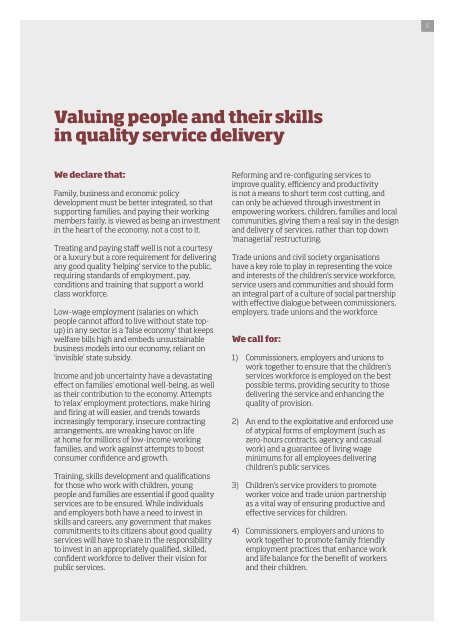Declaration-of-Interdependence-FINAL
Declaration-of-Interdependence-FINAL
Declaration-of-Interdependence-FINAL
Create successful ePaper yourself
Turn your PDF publications into a flip-book with our unique Google optimized e-Paper software.
5<br />
Valuing people and their skills<br />
in quality service delivery<br />
We declare that:<br />
Family, business and economic policy<br />
development must be better integrated, so that<br />
supporting families, and paying their working<br />
members fairly, is viewed as being an investment<br />
in the heart <strong>of</strong> the economy, not a cost to it.<br />
Treating and paying staff well is not a courtesy<br />
or a luxury but a core requirement for delivering<br />
any good quality ‘helping’ service to the public,<br />
requiring standards <strong>of</strong> employment, pay,<br />
conditions and training that support a world<br />
class workforce.<br />
Low-wage employment (salaries on which<br />
people cannot afford to live without state topup)<br />
in any sector is a ‘false economy’ that keeps<br />
welfare bills high and embeds unsustainable<br />
business models into our economy, reliant on<br />
‘invisible’ state subsidy.<br />
Income and job uncertainty have a devastating<br />
effect on families’ emotional well-being, as well<br />
as their contribution to the economy. Attempts<br />
to ‘relax’ employment protections, make hiring<br />
and firing at will easier, and trends towards<br />
increasingly temporary, insecure contracting<br />
arrangements, are wreaking havoc on life<br />
at home for millions <strong>of</strong> low-income working<br />
families, and work against attempts to boost<br />
consumer confidence and growth.<br />
Training, skills development and qualifications<br />
for those who work with children, young<br />
people and families are essential if good quality<br />
services are to be ensured. While individuals<br />
and employers both have a need to invest in<br />
skills and careers, any government that makes<br />
commitments to its citizens about good quality<br />
services will have to share in the responsibility<br />
to invest in an appropriately qualified, skilled,<br />
confident workforce to deliver their vision for<br />
public services.<br />
Reforming and re-configuring services to<br />
improve quality, efficiency and productivity<br />
is not a means to short term cost cutting, and<br />
can only be achieved through investment in<br />
empowering workers, children, families and local<br />
communities, giving them a real say in the design<br />
and delivery <strong>of</strong> services, rather than top down<br />
‘managerial’ restructuring.<br />
Trade unions and civil society organisations<br />
have a key role to play in representing the voice<br />
and interests <strong>of</strong> the children’s service workforce,<br />
service users and communities and should form<br />
an integral part <strong>of</strong> a culture <strong>of</strong> social partnership<br />
with effective dialogue between commissioners,<br />
employers, trade unions and the workforce<br />
We call for:<br />
1) Commissioners, employers and unions to<br />
work together to ensure that the children’s<br />
services workforce is employed on the best<br />
possible terms, providing security to those<br />
delivering the service and enhancing the<br />
quality <strong>of</strong> provision.<br />
2) An end to the exploitative and enforced use<br />
<strong>of</strong> atypical forms <strong>of</strong> employment (such as<br />
zero-hours contracts, agency and casual<br />
work) and a guarantee <strong>of</strong> living wage<br />
minimums for all employees delivering<br />
children’s public services.<br />
3) Children’s service providers to promote<br />
worker voice and trade union partnership<br />
as a vital way <strong>of</strong> ensuring productive and<br />
effective services for children.<br />
4) Commissioners, employers and unions to<br />
work together to promote family friendly<br />
employment practices that enhance work<br />
and life balance for the benefit <strong>of</strong> workers<br />
and their children.


